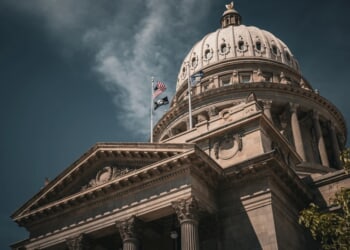There is so much going on in litigation against President Trump’s various policies that it’s tough to keep track of it.
One of the basics I learned long ago in law school is that a court has jurisdiction only over the parties before it whether it is a civil or criminal matter. Courts have, again and again, gone against that basic tenet of American jurisprudence and have issued national injunctions against Trump’s various policies.
In what may have been a staged performance, Van Holland sat at a sidewalk café with Garcia sipping margaritas.
We are all familiar with U.S. District Court Judge James Boasberg’s injunction against deportation of Tren de Aragua members (the hyper-violent Venezuelan gang) and ordering the return of aircraft in flight. Boasberg’s belief that he could hold Trump administration officials in contempt for — allegedly — violating his order was stayed temporarily by the U.S. Court of Appeals for the DC Circuit.
The Supreme Court has ruled that any habeas corpus hearings had to be held in the jurisdiction that the person was detained in seemed to divest Boasberg of jurisdiction over it, but he continues to make a fight of it.
In the latest example of judges going beyond the parties before it is Judge Indira Talwani’s blocking of Trump’s plan to revoke the immigration protection granted to about 530,000 Cuban, Haitian, Nicaraguan, and Venezuelan refugees who had entered the country “legally” under a Biden program. Trump’s Homeland Security Administration planned to void that program and told the people involved to self-deport. That was knocked into a cocked hat by Talwani’s injunction which said that the 530,000 cases had to be heard individually.
Trump is doing the right thing but in the wrong way. The people who entered legally under the Biden executive order cannot, retroactively, be thrown out under a new Trump executive order. There may be other grounds for deporting them but that’s up to the courts to decide.
Talwani’s decision is an attempt to tie up the immigration courts indefinitely on deportation cases. Trump may be sustained by higher courts but the case is not clearly one in which Trump is right and the lower court is wrong.
Republican House members passed a bill about 10 days ago that would have restricted judges to rulings affecting the parties before the court, which made a lot of sense and would do away with class actions (see below). As usual the bill — which made more sense than anything that’s gone on lately — died in the Senate. Immigrant-friendly lawyers want to, and possibly can, get around even that bill by asserting a class protection to a huge group of illegal immigrants.
But there is another consideration. Class actions can extend a court’s jurisdiction to any member of a “class” that is affected. This is done typically for people who have been overcharged by a business and seek refunds. Courts can extend that protection to illegal immigrants.
Several liberal commentators have said we were immersed in a Constitutional crisis. That’s not true but the Trump administration and the courts seem to be building up to one.
A real Constitutional crisis would be created by a president refusing to obey a court’s decision. That hasn’t happened yet. Trump’s administration has appealed the worst decisions and those decisions are working their way to the Supreme Court.
Included among the examples liberals give of the “Constitutional crisis” is Trump’s ban on birthright citizenship. As this column has written before, the only case in which the Supreme Court ruled on the subject is the 1898 decision in Wong Kim Ark. In that case, the Supreme Court held that a person whose parents were legal immigrants had the right to birthright citizenship. It has never ruled in a case in which the parents were illegal immigrants.
Trump is on the right side of that issue and the Supreme Court may well approve his limitation.
The Supreme Court’s decisions, as of now, have avoided a confrontation with Trump. The decisions — including the one given last week — simply continued the ban on decisions in jurisdictions where the illegal immigrants are not held.
The Democrats have chosen a hill to die on. It is the case of Kilmar Abrego Garcia, an MS-13 gang member deported to El Salvador, apparently by mistake. The Supreme Court has already ruled that the Trump administration should “facilitate” Garcia’s return. The Trump administration has said, in effect, that even if he is returned to the U.S. that he will be deported again.
Trump Against the Dems
That didn’t prevent Sen. Van Holland (D-Md) from visiting Garcia. In what may have been a staged performance, Van Holland sat at a sidewalk café with Garcia sipping margaritas.
Garcia was in the U.S. illegally and is a citizen of El Salvador. An immigration judge ruled that his fear of persecution in El Salvador was enough to release him and bar his deportation. He was detained again and then deported to El Salvador where he apparently joined the other deportees in a maximum security prison there.
A few days after the Supreme Court’s ruling, El Salvadoran President Nayib Bukele visited Trump in the White House. When asked about Abrego, Bukele said he couldn’t return a “terrorist” to the U.S. Trump smiled as if to say he’d like to obey the Supreme Court’s ruling but just can’t.
The U.S. government clearly has the right to deport people who entered the country illegally but the courts are right in insisting on a due process habeas corpus hearing. Trump has already deported about 100,000 illegals and the count is rising. But the courts — including the administrative hearings before an immigration judge — will determine whether any further deportations will be accomplished.
These cases may go on beyond Trump’s last term as president. If a Democrat succeeds him, everything he has done about illegal immigration will probably come to an end.
READ MORE from Jed Babbin:


![NYC Tourist Helicopter Falls into Hudson River, Siemens Executive and Family Among Those Killed [WATCH]](https://www.right2024.com/wp-content/uploads/2025/04/NYC-Tourist-Helicopter-Falls-into-Hudson-River-Siemens-Executive-and-350x250.jpg)






![Green Day’s Cringe Trump Diss Ends in Fire and Evacuation [WATCH]](https://www.right2024.com/wp-content/uploads/2025/04/Green-Days-Cringe-Trump-Diss-Ends-in-Fire-and-Evacuation-350x250.jpg)
![Red Sox Fan Makes the ‘Catch of the Day’ with Unconventional ‘Glove’ [WATCH]](https://www.right2024.com/wp-content/uploads/2025/04/Red-Sox-Fan-Makes-the-‘Catch-of-the-Day-with-350x250.jpg)






